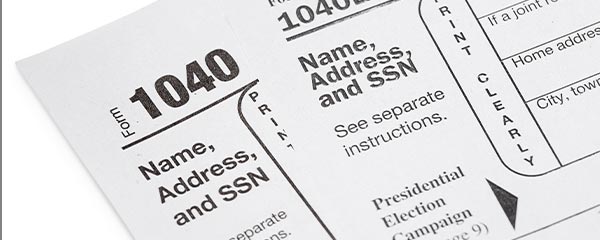PRINCETON, NJ -- Americans' preferences for deficit reduction clearly favor spending cuts to tax increases, but most Americans favor a mix of the two approaches. Twenty percent favor an approach that relies only on spending cuts and 4% favor an approach that uses tax increases alone.
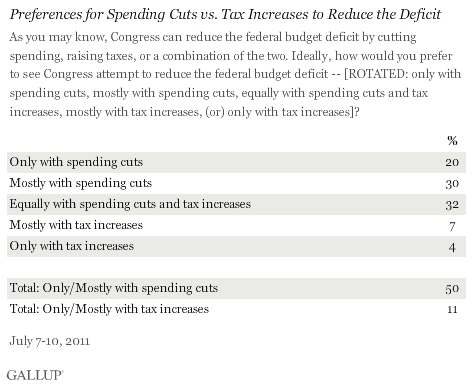
These results are based on a July 7-10 Gallup poll, conducted as government leaders from both parties continued negotiating an agreement to raise the federal debt limit. Both Republicans and Democrats appear willing to raise the debt limit, provided the government outlines plans to significantly reduce federal deficits in the future. The parties generally agree on making deep spending cuts, but do not agree on whether tax increases should be included to help reach their target goals for deficit reduction. Many Republicans in Congress oppose any such tax increases; thus, the legislation may not pass if tax hikes are included.
Americans do not necessarily share this view, with 20% saying deficit reduction should come only through spending cuts. That percentage is a little higher, 26%, among those who identify as Republicans. Republicans do, however, tilt heavily in favor of reducing the deficit primarily if not exclusively with spending cuts (67%) as opposed to tax increases (3%). Fifty-one percent of independents share that preference. Democrats are most inclined to want equal amounts of spending cuts and tax increases (42%), though more favor a tilt toward spending cuts (33%) than tax increases (20%).
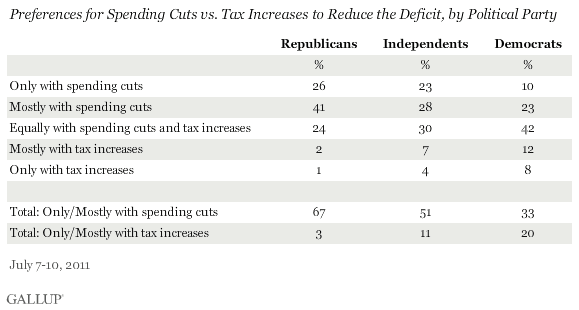
The question does not make clear what types of tax increases Americans might be willing to accept, or whether those saying deficit reduction should come "mostly" from spending cuts would prefer that the proportion of spending cuts be closer to 51% or 99%. The public has been willing to endorse higher taxes on wealthy Americans in recent months, in terms of allowing Bush-era income tax cuts to expire and as a means of keeping Social Security solvent.
Spending a Key Worry for Americans on Debt Limit Increase
Gallup finds about 6 in 10 Americans paying close attention to the debate about raising the debt limit. When the same poll asked for their general position on raising the limit, without providing reasons for doing so or not doing so, Americans were more likely to oppose an increase than favor one. The 42% who are opposed to doing so generally find fault with the government's spending patterns when asked in an open-ended format to explain their views.
The most common reasons given for opposing an increased debt limit are that the U.S. already has too much debt and cannot afford more, that the government needs to control its spending, and that it needs to do a better job of budgeting and living within its means. Another common response is that raising the debt limit does not implicitly address the government's debt problem, and that government would likely just keep raising the limit in the future.
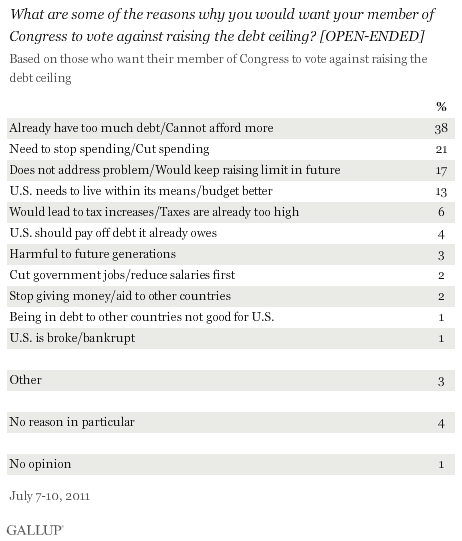
The smaller proportion of Americans who favor an increase to the debt limit, 22%, are most likely to believe the United States has little choice in the matter -- in other words, the action may be undesirable but is necessary. Most commonly, proponents say they favor increasing the limit to avoid an economic catastrophe, which some experts including Treasury Secretary Tim Geithner predict will occur if the government is no longer able to borrow money. The other most common reasons for favoring a higher debt limit are that the U.S. cannot default on its debt, that the country simply has "no choice" in the matter, and to avoid a disruption of government services and benefits.
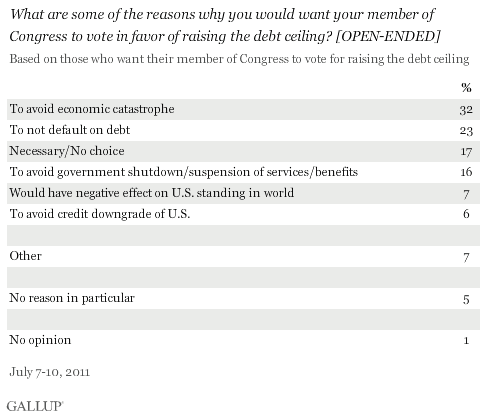
Responses on both sides to a large degree reflect the arguments political leaders are making. Two of the most common, and arguably the dominant themes of the open-ended responses, are concerns about the effect that not raising the debt limit will have on the economy versus concerns that raising it will not sufficiently address government spending. In the same poll, Gallup asked Americans which of these two risks concerned them more, and the public expressed greater concern about raising the debt ceiling without a plan for major cuts in future government spending (51%) than about the potential harm to the economy if the debt ceiling is not raised (32%).
Implications
Government spending seems to be the primary worry for Americans when their opinions are probed about raising the debt limit. Government leaders appear to be listening, as party leaders are proposing major cuts in future government spending as a way to persuade members of Congress to vote for an increase in the nation's debt limit. In terms of deficit reduction, Americans seem to generally back an approach that relies more on spending cuts than tax increases. A key question to be answered in the days ahead is whether an agreement to raise the debt ceiling will include any tax increases. This is something many Republican members of Congress oppose, but most Americans do not seem to share this view.
Survey Methods
Results for this Gallup poll are based on telephone interviews conducted July 7-10, 2011, with a random sample of 1,016 adults, aged 18 and older, living in all 50 U.S. states and the District of Columbia.
For results based on the total sample of national adults, one can say with 95% confidence that the maximum margin of sampling error is ±4 percentage points.
For results based on the total sample of 460 adults who oppose the government raising the debt ceiling, one can say with 95% confidence that the maximum margin of sampling error is ±6 percentage points.
For results based on the total sample of 273 adults who favor the government raising the debt ceiling, one can say with 95% confidence that the maximum margin of sampling error is ±7 percentage points.
Interviews are conducted with respondents on landline telephones and cellular phones, with interviews conducted in Spanish for respondents who are primarily Spanish-speaking. Each sample includes a minimum quota of 400 cell phone respondents and 600 landline respondents per 1,000 national adults, with additional minimum quotas among landline respondents for gender within region. Landline telephone numbers are chosen at random among listed telephone numbers. Cell phone numbers are selected using random-digit-dial methods. Landline respondents are chosen at random within each household on the basis of which member had the most recent birthday.
Samples are weighted by gender, age, race, Hispanic ethnicity, education, region, adults in the household, and phone status (cell phone only/landline only/both, cell phone mostly, and having an unlisted landline number). Demographic weighting targets are based on the March 2010 Current Population Survey figures for the aged 18 and older non-institutionalized population living in U.S. telephone households. All reported margins of sampling error include the computed design effects for weighting and sample design.
In addition to sampling error, question wording and practical difficulties in conducting surveys can introduce error or bias into the findings of public opinion polls.
View methodology, full question results, and trend data.
For more details on Gallup's polling methodology, visit www.gallup.com.
